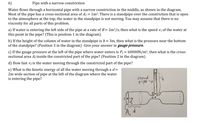
Elements Of Electromagnetics
7th Edition
ISBN: 9780190698614
Author: Sadiku, Matthew N. O.
Publisher: Oxford University Press
expand_more
expand_more
format_list_bulleted
Concept explainers
Question
2020Q6: Please answer all parts in specific detail and explain each step with reasoning

Transcribed Image Text:6)
Pipe with a narrow constriction
Water flows through a horizontal pipe with a narrow constriction in the middle, as shown in the diagram.
Most of the pipe has a cross-sectional area of A1= 1m². There is a standpipe over the constriction that is open
to the atmosphere at the top; the water in the standpipe is not moving. You may assume that there is no
viscosity for all parts of this problem.
a) If water is entering the left side of the pipe at a rate of B= 2m³ /s, then what is the speed vị of the water at
this point in the pipe? (This is position 1 in the diagram)
b) If the height of the column of water in the standpipe is h= 3m, then what is the pressure near the bottom
of the standpipe? (Position 3 in the diagram) Give your answer in gauge pressure.
c) If the gauge pressure at the left of the pipe where water enters is P1= 60000N/m², then what is the cross-
sectional area A2 inside the constricted part of the pipe? (Position 2 in the diagram)
d) How fast v2 is the water moving through the constricted part of the pipe?
e) What is the kinetic energy of all the water moving through a d=
2m wide section of pipe at the left of the diagram where the water
is entering the pipe?
stand
pipe
A,
Expert Solution
This question has been solved!
Explore an expertly crafted, step-by-step solution for a thorough understanding of key concepts.
This is a popular solution
Trending nowThis is a popular solution!
Step by stepSolved in 4 steps with 1 images

Knowledge Booster
Learn more about
Need a deep-dive on the concept behind this application? Look no further. Learn more about this topic, mechanical-engineering and related others by exploring similar questions and additional content below.Similar questions
- YouTube Mall Over... Leeds International... M1 Questions by To... Question Completion Status: QUESTION 2 A car of mass 750 kg moves along a stretch of road which can be modelled as a line of greatest slope of a plane inclined to the horizontal at 30°. As the car moves up the roa for 500 m its speed reduces from 20 ms-¹ to 15 ms-¹. Calculate: a the loss of kinetic energy of the car 65,625) 66,625 67,625) O 68,625)arrow_forwardT'sec In helical spring experiment a student plotted the graph of T2 versus the oscillating mass (M), and Used the slope to find the spring :constant, the value of k is 1.0 0.9 0.8 0.7 0.6 0.5 0.4 0.3 0.2 0.1 0.0 O. O a. 13.3 N/m O b. 6.8N/m O c. 5 N/m O d. 3.3 N/m O e. 24 N/m 5 10 15 20 25 30 35 40 45 50 55 60 65 M (9) 70 75 80arrow_forward
arrow_back_ios
arrow_forward_ios
Recommended textbooks for you
 Elements Of ElectromagneticsMechanical EngineeringISBN:9780190698614Author:Sadiku, Matthew N. O.Publisher:Oxford University Press
Elements Of ElectromagneticsMechanical EngineeringISBN:9780190698614Author:Sadiku, Matthew N. O.Publisher:Oxford University Press Mechanics of Materials (10th Edition)Mechanical EngineeringISBN:9780134319650Author:Russell C. HibbelerPublisher:PEARSON
Mechanics of Materials (10th Edition)Mechanical EngineeringISBN:9780134319650Author:Russell C. HibbelerPublisher:PEARSON Thermodynamics: An Engineering ApproachMechanical EngineeringISBN:9781259822674Author:Yunus A. Cengel Dr., Michael A. BolesPublisher:McGraw-Hill Education
Thermodynamics: An Engineering ApproachMechanical EngineeringISBN:9781259822674Author:Yunus A. Cengel Dr., Michael A. BolesPublisher:McGraw-Hill Education Control Systems EngineeringMechanical EngineeringISBN:9781118170519Author:Norman S. NisePublisher:WILEY
Control Systems EngineeringMechanical EngineeringISBN:9781118170519Author:Norman S. NisePublisher:WILEY Mechanics of Materials (MindTap Course List)Mechanical EngineeringISBN:9781337093347Author:Barry J. Goodno, James M. GerePublisher:Cengage Learning
Mechanics of Materials (MindTap Course List)Mechanical EngineeringISBN:9781337093347Author:Barry J. Goodno, James M. GerePublisher:Cengage Learning Engineering Mechanics: StaticsMechanical EngineeringISBN:9781118807330Author:James L. Meriam, L. G. Kraige, J. N. BoltonPublisher:WILEY
Engineering Mechanics: StaticsMechanical EngineeringISBN:9781118807330Author:James L. Meriam, L. G. Kraige, J. N. BoltonPublisher:WILEY

Elements Of Electromagnetics
Mechanical Engineering
ISBN:9780190698614
Author:Sadiku, Matthew N. O.
Publisher:Oxford University Press

Mechanics of Materials (10th Edition)
Mechanical Engineering
ISBN:9780134319650
Author:Russell C. Hibbeler
Publisher:PEARSON

Thermodynamics: An Engineering Approach
Mechanical Engineering
ISBN:9781259822674
Author:Yunus A. Cengel Dr., Michael A. Boles
Publisher:McGraw-Hill Education

Control Systems Engineering
Mechanical Engineering
ISBN:9781118170519
Author:Norman S. Nise
Publisher:WILEY

Mechanics of Materials (MindTap Course List)
Mechanical Engineering
ISBN:9781337093347
Author:Barry J. Goodno, James M. Gere
Publisher:Cengage Learning

Engineering Mechanics: Statics
Mechanical Engineering
ISBN:9781118807330
Author:James L. Meriam, L. G. Kraige, J. N. Bolton
Publisher:WILEY